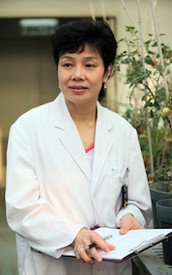Engineering Plants for a Brighter Future
Plant biologists at HKU offer two technologies that may help address climate change and crop productivity.
Climate change and population growth are the twin challenges over our time. How do we feed a growing population (expected to increase by two billion people by 2050 according to the United Nations Department of Economic and Social Affairs) when the conditions for plant growth are becoming more difficult? Plant biologists at HKU are offering help with two new technologies, one that can improve the ability of plants to cope with drought and another that improves crop productivity while reducing carbon dioxide emissions.
The technologies have emerged from the School of Biological Sciences, where researchers have genetically engineered the plant Arabidopsis thaliana, thale cress, in two separate projects.
Professor Mee-Len Chye, Wilson and Amelia Wong Professor in Plant Biotechnology, boosted expression of the ACBP2 protein in the plant, which enabled it to retain more water and enhance its drought tolerance. The technology has been licensed to the US-based agribusiness, Agragen, and she hopes to extend the findings to crop plants.
"When we started I could not foresee that this class of protein would confer stress tolerance in plants – nobody knew," she said. "Drought tolerance is an extremely useful characteristic because it can allow us to extend the area in which plants are grown."
Separately, Professor Chye has also manipulated another protein in the same family to enable transgenic Arabidopsis flowers withstand freezing temperatures. "Finding ways to protect plants from environmental stress is an important research area given that plants form critical components in food webs and food chains," she said.
Meanwhile, Associate Professor Dr Wallace BL Lim discovered a novel plant growth promoting gene, PAP2, which is present in the genomes of most plants including A. thaliana. His team was the first to study the gene's function and showed that the gene can speed up plant growth and increase yield in Arabidopsis thaliana (seed yield +38-57%), Camelina sativa (a biofuel crop, seed yield +50-110%) and potato (tuber yield +50%) by promoting photosynthesis. Agragen has licensed the right of this gene in Camelina sativa.
"I am curious to see if this technology can be applied to trees and green algae. If it works in these organisms, they might increase carbon dioxide absorption and reduce CO2 accumulation in the atmosphere," Dr Lim said.
Taken together, these achievements are important contributions to the question of how to feed people in future. "Currently our biggest challenge in terms of global population growth is how to feed more people without further damaging the planet," Professor Chye said. "We need to increase food production by 70 per cent in the next 40 years and genetic modification is an important tool to use, together with traditional plant breeding."



